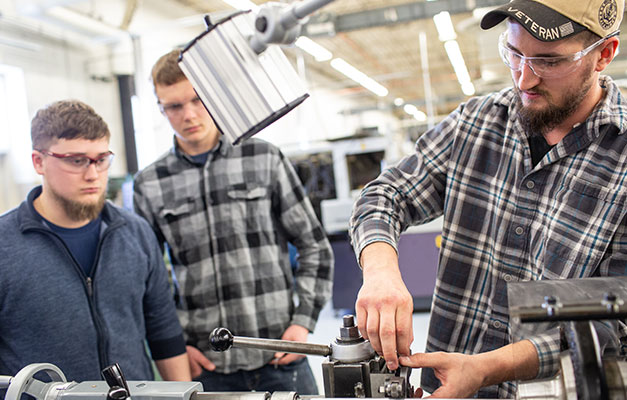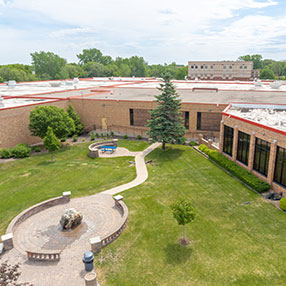These certificates prepare individuals for entry-level to mid-level positions to operate, perform and basic setup on the following equipment:
-
- Manual lathes
- Drills
- Mills
- Grinders
- CNC Mills
- CNC lathes
- CAD/CAM
Program graduates are skilled in the areas of blueprint reading, GD&T, statistical process control, lean manufacturing, math, inspection, and the correct sequence of operation required.
These certificates allow individuals to enter the workforce quickly with strong skills or can be applied toward the diploma or Associate of Applied Science (AAS) degree programs.
Why Study Machine Technology at Anoka Tech?

100% job placement

High growth rate compared to other careers in Minnesota

Hands-on training from industry experts
Industry & Career Outlook
Potential Jobs
- Machine Setters
- Model Makers
Salary Information:
Median Wage: $29.59 per hour
Top Earners: $37.02 per hour
Information provided is for Minnesota. See current data at mn.gov/deed.
Other Program Info
Take a self-guided virtual tour of our campus to see what it's like to be a student at Anoka Tech. View program labs, common student spaces, campus offices and more.
On the first day of class all you will need is a pair of safety glasses.
We will review tools in the first few days and help you understand where better quality tools are needed. Anoka Tech also partners with several vendors to provide students with discounted tools.
Students can choose to complete the Machine Trade programs part-time. Part-time students will take longer to complete their program than students who follow the full-time sequence listed. Because every course may not be offered each semester with both day and evening options, it is important for part-time students to reach out to their faculty advisors for help in planning their long-term, part-time course sequence.
Below, new machine trades students can find first semester part-time course options. After the first semester, work with your faculty advisors to plan future semesters.
Note: In each option, you will see a choice of MACH 1171 Math for Machinists or MATH 1650 College Trigonometry. Diploma students are required to take MACH 1171 and AAS degree students are required to take MATH 1650.
First Semester Course Options
First semester part-time course options (choose option 1, 2, or 3):
Option 1: All Lecture Courses
MACH 1171 or MATH 1650 - Math for Machinist or College Trigonometry
MACH 1132 - Blueprint Reading
MACH 1121 - Metrology
MACH 1140 - CAD 1
Option 2: Lecture Courses + Milling Lab
MACH 1171 or MATH 1650 - Math for Machinist or College Trigonometry
MACH 1132 - Blueprint Reading
MACH 1121 - Metrology
MACH 1140 - CAD 1
MACH 1101 - Milling
Option 3: Lecture Courses + Lathe
MACH 1171 or MATH 1650 - Math for Machinist or College Trigonometry
MACH 1132 - Blueprint Reading
MACH 1121 - Metrology
MACH 1140 - CAD 1
MACH 1106 - Lathe
Developmental Courses
Diploma students: MACH 1171 Math for Machinists requires an Arithmetic ACCUPLACER score of 265. Students who do not meet any of the prerequisites must take the developmental course MATH 0801 Basic Math in their first semester and
then MACH 1171 in their second semester.
AAS degree students: MATH 1650 College Trigonometry requires an Advanced Algebra Functions ACCUPLACER score of 250. Students who do not meet any of the prerequisites must take the appropriate developmental math course(s) (MATH 0801 Basic Math and/or MATH 0900 Elementary Algebra) as determined by the placement chart before taking MATH 1650.
CNC Design & Manufacturing Technology
AAS degree, diploma
CNC Service Technician
Diploma
Quality Inspector
Certificate
Info for Current Students
On the first day of class all you will need is a pair of safety glasses.
We will review tools in the first few days and help you understand where better quality tools are needed. Anoka Tech also partners with several vendors to provide students with discounted tools.
The Anoka Technical College Machine Technology certificate 1, 2, and 3 programs prepare individuals for entry-level to mid-level positions to operate, perform and basic setup on industry standard equipment.
Program graduates are skilled in the areas of blueprint reading, GD&T, statistical process control, lean manufacturing, math, inspection, and the correct sequence of operation required.
These certificates allow individuals to enter the workforce quickly with strong skills or can be applied toward the CNC Manufacturing Technology diploma or Associate of Applied Science (AAS) degree programs.
Why Study Machine Technology at Anoka Tech?

100% job placement

High growth rate compared to other careers in Minnesota

Hands-on training from industry experts
Industry & Career Outlook
Potential Jobs
- Machine Setters
- Model Makers
Salary Information:
Median Wage: $29.59 per hour
Top Earners: $37.02 per hour
Information provided is for Minnesota. See current data at mn.gov/deed.
Other Program Info
Take a self-guided virtual tour of our campus to see what it's like to be a student at Anoka Tech. View program labs, common student spaces, campus offices and more.
On the first day of class all you will need is a pair of safety glasses.
We will review tools in the first few days and help you understand where better quality tools are needed. Anoka Tech also partners with several vendors to provide students with discounted tools.
Students can choose to complete the Machine Trade programs part-time. Part-time students will take longer to complete their program than students who follow the full-time sequence listed. Because every course may not be offered each semester with both day and evening options, it is important for part-time students to reach out to their faculty advisors for help in planning their long-term, part-time course sequence.
Below, new machine trades students can find first semester part-time course options. After the first semester, work with your faculty advisors to plan future semesters.
Note: In each option, you will see a choice of MACH 1171 Math for Machinists or MATH 1650 College Trigonometry. Diploma students are required to take MACH 1171 and AAS degree students are required to take MATH 1650. See the Developmental Courses section on page 2 for more important information regarding your math requirement.
First Semester Course Options
First semester part-time course options (choose option 1, 2, or 3):
Option 1: All Lecture Courses
MACH 1171 or MATH 1650 - Math for Machinist or College Trigonometry
MACH 1132 - Blueprint Reading
MACH 1121 - Metrology
MACH 1140 - CAD 1
Option 2: Lecture Courses + Milling Lab
MACH 1171 or MATH 1650 - Math for Machinist or College Trigonometry
MACH 1132 - Blueprint Reading
MACH 1121 - Metrology
MACH 1140 - CAD 1
MACH 1101 - Milling
Option 3: Lecture Courses + Lathe
MACH 1171 or MATH 1650 - Math for Machinist or College Trigonometry
MACH 1132 - Blueprint Reading
MACH 1121 - Metrology
MACH 1140 - CAD 1
MACH 1106 - Lathe
Developmental Courses
Diploma students: MACH 1171 Math for Machinists requires an Arithmetic ACCUPLACER score of 265. Students who do not meet any of the prerequisites must take the developmental course MATH 0801 Basic Math in their first semester and
then MACH 1171 in their second semester.
AAS degree students: MATH 1650 College Trigonometry requires an Advanced Algebra Functions ACCUPLACER score of 250. Students who do not meet any of the prerequisites must take the appropriate developmental math course(s) (MATH 0801 Basic Math and/or MATH 0900 Elementary Algebra) as determined by the placement chart before taking MATH 1650.
CNC Design & Manufacturing Technology
AAS degree, diploma
CNC Service Technician
Diploma
Quality Inspector
Certificate
Info for Current Students
On the first day of class all you will need is a pair of safety glasses.
We will review tools in the first few days and help you understand where better quality tools are needed. Anoka Tech also partners with several vendors to provide students with discounted tools.
Why Study Machine Technology at Anoka Tech?

100% job placement

High growth rate compared to other careers in Minnesota

Hands-on training from industry experts
Potential Jobs
- Machine Setters
- Model Makers
Salary Information:
Median Wage: $29.59 per hour
Top Earners: $37.02 per hour
Information provided is for Minnesota. See current data at mn.gov/deed.
Other Program Info
Take a self-guided virtual tour of our campus to see what it's like to be a student at Anoka Tech. View program labs, common student spaces, campus offices and more.
Students can choose to complete the Machine Trade programs part-time. Part-time students will take longer to complete their program than students who follow the full-time sequence listed. Because every course may not be offered each semester with both day and evening options, it is important for part-time students to reach out to their faculty advisors for help in planning their long-term, part-time course sequence.
Below, new machine trades students can find first semester part-time course options. After the first semester, work with your faculty advisors to plan future semesters.
Note: In each option, you will see a choice of MACH 1171 Math for Machinists or MATH 1650 College Trigonometry. Diploma students are required to take MACH 1171 and AAS degree students are required to take MATH 1650.
First Semester Course Options
First semester part-time course options (choose option 1, 2, or 3):
Option 1: All Lecture Courses
MACH 1171 or MATH 1650 - Math for Machinist or College Trigonometry
MACH 1132 - Blueprint Reading
MACH 1121 - Metrology
MACH 1140 - CAD 1
Option 2: Lecture Courses + Milling Lab
MACH 1171 or MATH 1650 - Math for Machinist or College Trigonometry
MACH 1132 - Blueprint Reading
MACH 1121 - Metrology
MACH 1140 - CAD 1
MACH 1101 - Milling
Option 3: Lecture Courses + Lathe
MACH 1171 or MATH 1650 - Math for Machinist or College Trigonometry
MACH 1132 - Blueprint Reading
MACH 1121 - Metrology
MACH 1140 - CAD 1
MACH 1106 - Lathe
Developmental Courses
Diploma students: MACH 1171 Math for Machinists requires an Arithmetic ACCUPLACER score of 265. Students who do not meet any of the prerequisites must take the developmental course MATH 0801 Basic Math in their first semester and
then MACH 1171 in their second semester.
AAS degree students: MATH 1650 College Trigonometry requires an Advanced Algebra Functions ACCUPLACER score of 250. Students who do not meet any of the prerequisites must take the appropriate developmental math course(s) (MATH 0801 Basic Math and/or MATH 0900 Elementary Algebra) as determined by the placement chart before taking MATH 1650.
On the first day of class all you will need is a pair of safety glasses.
We will review tools in the first few days and help you understand where better quality tools are needed. Anoka Tech also partners with several vendors to provide students with discounted tools.
CNC Design & Manufacturing Technology
AAS degree, diploma
CNC Service Technician
Diploma
Quality Inspector
Certificate
Info for Current Students
On the first day of class all you will need is a pair of safety glasses.
We will review tools in the first few days and help you understand where better quality tools are needed. Anoka Tech also partners with several vendors to provide students with discounted tools.
Start Dates:
Fall semester: August
Spring semester: January






